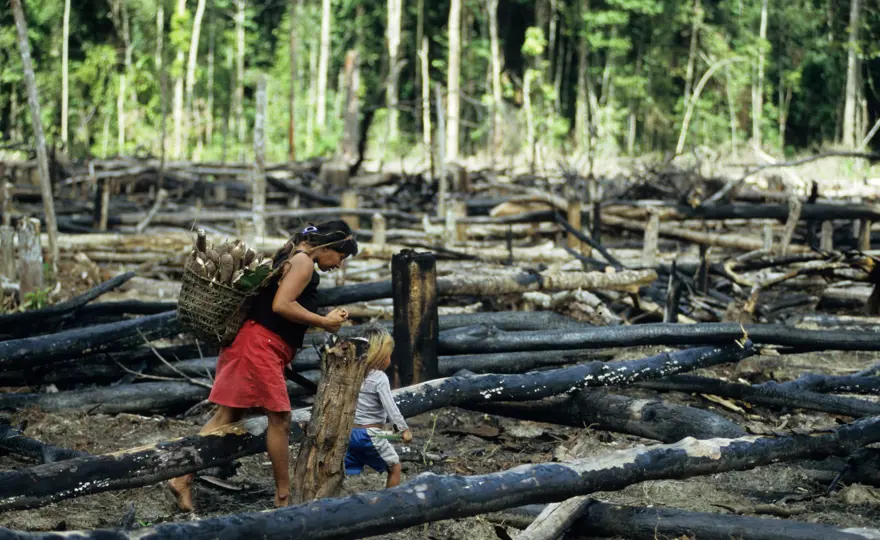
Matthew French
24th July 2025


Brazil’s proposed environmental licensing law would let corporations dodge accountability, at enormous cost to people and planet
At ClientEarth, we believe that no one should be above the law — especially when it comes to protecting our health, our communities, and the environment we all depend on. But in Brazil, a powerful few are pushing a dangerous new bill that would let major corporate interests skirt their legal obligations to protect the environment, to potentially devastating effect.
The legislation, formally known as Projeto de Lei 2.159/2021 but widely referred to as the PL da Devastação – the Devastation Bill – passed both houses of Brazil’s Congress on July 17 despite opposition from hundreds of civil society organizations. President Luiz Inácio Lula da Silva has 15 working days from its passage to decide whether to approve or veto the legislation. Even if vetoed, there remains a risk that a congressional supermajority will reinstate it, triggering what many anticipate will be a battle in Brazil’s top court, the Supremo Tribunal Federal.
This bill would gut Brazil’s environmental licensing system, handing corporate polluters a free pass and shifting risks and costs onto the public. Environmental groups and legal experts have described the bill’s passage as the most significant setback to Brazil’s environmental protections in decades.
This isn’t just environmental deregulation. It’s a deliberate rollback of corporate accountability.
At the heart of the Devastation Bill is a radical rollback of oversight. It would facilitate the process for companies, including those behind projects and activities of medium-scale and with notable environmental impact, to self-certify their compliance with environmental standards through little more than a good-faith online form. Certain industries, including agribusiness, could be fully exempt from licensing requirements altogether. And projects deemed to be of national strategic importance could have their licensing fast-tracked to approval, even where it is acknowledged that they would cause significant environmental harm.
The consequences would be sweeping. By weakening oversight, impacted communities would face even greater barriers to preventing harm or seeking justice when it occurs. The bill would make it easier to disguise real environmental and climate risks, skewing assessments used by investors, financiers, and regulators. And when disasters do occur — as with the catastrophic Mariana and Brumadinho dam collapses in the Brazilian state of Minas Gerais that killed hundreds and laid waste to entire river systems — it would likely be the public, not polluters, left to foot the bill.
This isn’t just environmental deregulation. It’s a deliberate rollback of corporate accountability. The bill distances powerful multinational companies and financial institutions from their legal obligations to prevent, reduce, or remedy the impacts of their actions, eroding protections for ecosystems, distorting markets, and deepening inequalities.
Those most likely to benefit, such as mining and fossil fuel companies, agribusiness giants, and infrastructure developers, are already among the most significant drivers of deforestation, greenhouse gas emissions, and human rights violations in Brazil and worldwide. Those most likely to suffer, including Indigenous and traditional communities and others vulnerable to environmental harm and inequality, would lose what few safeguards they currently have.
What happens in Brazil affects communities around the world. When environmental protections are dismantled, the harm extends far beyond national borders: climate risks grow, global supply chains are disrupted, and it becomes easier for companies to obscure their misconduct and avoid accountability.
But opposition to the Devastation Bill is strong. Whether through presidential veto or judicial challenge, the fight is far from over. More than 350 civil society organizations and social movements in Brazil and beyond have spoken out against the legislation, and legal experts have raised concerns about its constitutionality. And perhaps most notably, Brazil’s minister of the environment and climate change, Marina Silva, has been an outspoken critic of the bill and has led the charge in amassing significant political and popular resistance to it.
ClientEarth Americas adds our voice to this call. At a time when bold, enforceable climate action is urgently needed, the Devastation Bill does the opposite. It hands polluters a blank check and leaves ordinary people to clean up the mess. Environmental law must instead be enforceable, transparent, and rooted in justice – and ClientEarth Americas stands alongside the groundswell of Brazilian voices in commitment to that cause.